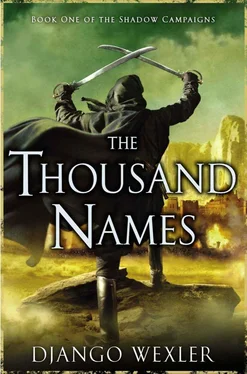Django Wexler - The Thousand Names
Здесь есть возможность читать онлайн «Django Wexler - The Thousand Names» весь текст электронной книги совершенно бесплатно (целиком полную версию без сокращений). В некоторых случаях можно слушать аудио, скачать через торрент в формате fb2 и присутствует краткое содержание. Жанр: Фэнтези, на английском языке. Описание произведения, (предисловие) а так же отзывы посетителей доступны на портале библиотеки ЛибКат.
- Название:The Thousand Names
- Автор:
- Жанр:
- Год:неизвестен
- ISBN:нет данных
- Рейтинг книги:4 / 5. Голосов: 1
-
Избранное:Добавить в избранное
- Отзывы:
-
Ваша оценка:
- 80
- 1
- 2
- 3
- 4
- 5
The Thousand Names: краткое содержание, описание и аннотация
Предлагаем к чтению аннотацию, описание, краткое содержание или предисловие (зависит от того, что написал сам автор книги «The Thousand Names»). Если вы не нашли необходимую информацию о книге — напишите в комментариях, мы постараемся отыскать её.
The Thousand Names — читать онлайн бесплатно полную книгу (весь текст) целиком
Ниже представлен текст книги, разбитый по страницам. Система сохранения места последней прочитанной страницы, позволяет с удобством читать онлайн бесплатно книгу «The Thousand Names», без необходимости каждый раз заново искать на чём Вы остановились. Поставьте закладку, и сможете в любой момент перейти на страницу, на которой закончили чтение.
Интервал:
Закладка:
The diminutive cavalry captain himself rode over to where Marcus, Janus, Fitz, and the regimental color party waited by the First Battalion square. He reined up and, his eyes gleaming, ripped off a tight salute to the colonel.
“Give me leave to charge them, sir,” he said, his pigeon chest swollen with pride. “I’ll clear that ridge in a flash.”
Janus raised a polite eyebrow. “You don’t think you’re at too much of a numerical disadvantage?”
“Each man in blue is worth a dozen of those cowardly goat-fuckers,” the captain said.
Marcus winced at this, but Janus was unperturbed.
“Indeed. Though, if our scouts are even marginally trustworthy, they would outnumber you roughly thirty to one. Possibly more.”
“But they won’t be ready for it!”
The colonel shook his head sadly, as though he would have loved nothing better in the world than to let the captain off his leash.
“I’m afraid the cavalry has too important a part to play in today’s battle to risk it at this stage, Captain. Keep your men close. You’re to shelter inside the Second Battalion square, understand?”
“But-” Give-Em-Hell caught Janus’ eye, and somewhat to Marcus’ astonishment he subsided. “Yes, sir. As you say.” He put his heels to his horse and rode toward where his men waited, near the front of the column.
Marcus leaned toward his commander. “I apologize for Captain Stokes, sir. He’s a good cavalryman, just a touch overeager.”
“Eagerness has virtues all its own, Captain.” Janus shrugged. “There is a place for every man, whatever his talent or temperament. Captain Stokes will have his turn.” He looked up at the ridge. “I can’t imagine what they’re up to. If they take much longer, I shall have to order up some artillery to hurry them along.”
The hilltop was dark with enemy horsemen gathering around a dozen black-clad priests who chose that moment to break into their sweet, high song. They all hit subtly different notes, and the result was a ringing harmony that echoed down from the ridge with a weird, unearthly beauty. Marcus felt his jaw tighten, but when he looked at Janus he saw that the colonel was sitting with his eyes closed, absorbing the melody. He opened them again only when the keening was answered by a roar that seemed to come from thousands of throats.
“Do Khandarai priests always sing like that before they enter battle?” Janus asked.
Marcus shrugged. “I don’t think so, sir. As far as I’m aware, it’s a Redeemer thing.”
“Hmm.” Janus looked thoughtful. “Pity.”
“Perhaps we ought to take shelter, sir?”
Janus examined his hand for a moment, flicked a bit of grit from under one fingernail, then looked up again at where the enemy horsemen were beginning to pour over the ridge. “Very well. Let’s find a safe vantage.”
The interior of the First Battalion’s square was a bare patch of trampled earth seventy yards or so to a side. Behind the triple ranks that formed the edge stood the lieutenants, one to each company, while the sergeants prowled back and forth. All around him, men loaded their weapons and fixed their bayonets.
Janus had produced a spyglass, a fearsomely expensive-looking thing in brass and blond wood. His horse’s height let him peer over the heads of the men around him, and he shook his head regretfully.
“A mob. Nothing more than a mob.”
Marcus watched the horsemen thundering down from the ridge. Without the aid of a glass, most of what he could see was the dust raised by their passage. The priests were still at the front, waving the others forward, and he could see a few of the “soldiers,” ragged men with improvised weapons, riding scrawny horses.
“A big mob,” he said. “From what the scouts said, there have to be three or four thousand of them.”
“Four thousand or forty, it makes no difference,” Janus said. “A charge like that will never break a solid square.” He gave Marcus a smile, his big gray eyes unreadable. “Assuming our men are up to it, of course. If not, things will become exciting very quickly.”
“They’re up to it, sir.” Marcus put a certainty into his voice that he didn’t feel.
“We’ll soon see.”
Marcus watched the approach of the riders impatiently. There was nothing for him to do , not now. The lieutenants would give the orders to load and fire, and they knew their business-or if they didn’t, it was too late to teach them. The gleaming line of bayonets shifted slightly as the men on the sides of the square turned in place to face the oncoming tide. Marcus felt oddly detached as the huge cloud of dust glided toward them, like the leading edge of a sandstorm.
“Level!” The shout, from a dozen throats at once, brought Marcus back to reality. The horsemen were only sixty yards away, coming on at the gallop, and their shouts filled the air. Fifty yards, then forty-
He never heard the order to fire, only a single musket’s crack followed by a roar that spread along the formation like a blaze catching in dry tinder. Two sides of the square flashed and boiled with smoke. He could see a few horses fall, but most of the effect was hidden by the dust. The first rank of soldiers knelt, bayonets braced in the dirt, while the third rank began to reload. The second had reserved their fire, the points of their blades projecting between the men of the first.
The last Marcus could truly see of the battle was the riders splitting against the point of the square, flowing around it like water breaking around a rock. Unable to charge home, they ended up riding along the faces of the formation, slashing impotently at the ranked bayonets. The second rank fired, and more horses went down. Then the dust of the riders’ charge mingled with the smoke to obscure his view entirely. He could hear the calls of the sergeants, to load and fire, but the organized crash of volleys was gone now. Each man fired at fleeting targets, or at no target at all, flinging his lead into the gritty fog and trusting that some Redeemer would stop it. Muzzle flashes from outside the square showed here and there through the murk, but few of the riders had pistols or carbines. Those that did seldom got a second chance to use them-the unmistakable glare of a shot instantly drew a dozen answering blasts from the faces of the square.
The other squares were fighting, too. Marcus could hear the thunder of their fire, but for all he could see they might as well have been on the face of the moon. He glanced across at Janus. The colonel sat, reins held lightly in his hands, his eyes closed in contemplation. The expression on his face was utterly relaxed, lips curved in a slight smile. It made Marcus look away, uncomfortable, as though he’d walked in on his superior doing something private and sordid.
It went on that way, and on and on and on, longer than Marcus would have believed possible. Out in the smoke, the riders circled, rode past, formed and charged, but all invisibly. Men fell on the faces of the square and were dragged into the center-here one who’d lost the fingers of one hand to a saber, there a boy with his elbow shattered by a carbine’s bullet. One by one the square filled with these unfortunates. The toll on the Redeemers was worse, far worse. Marcus knew it had to be, but the only evidence was the shouts of men and the screaming of horses. He began to feel as though there was no end to the men out there, as though his own soldiers would be picked off, one by one, until only he and Janus remained, alone in the fog-
The colonel opened his eyes, and his smile broadened.
“Well,” he said, “that would appear to be that.”
It was a few moments longer before Marcus realized he had the truth of it. The sound of hoofbeats on hard earth was fading, and the cracks of muskets sputtered out like a dying fire. The screams of the wounded, human and animal, seemed to rise in volume now that they were the only sounds on the field. Slowly, the fog of smoke and dust began to dissipate, prodded by the sea breeze.
Читать дальшеИнтервал:
Закладка:
Похожие книги на «The Thousand Names»
Представляем Вашему вниманию похожие книги на «The Thousand Names» списком для выбора. Мы отобрали схожую по названию и смыслу литературу в надежде предоставить читателям больше вариантов отыскать новые, интересные, ещё непрочитанные произведения.
Обсуждение, отзывы о книге «The Thousand Names» и просто собственные мнения читателей. Оставьте ваши комментарии, напишите, что Вы думаете о произведении, его смысле или главных героях. Укажите что конкретно понравилось, а что нет, и почему Вы так считаете.











